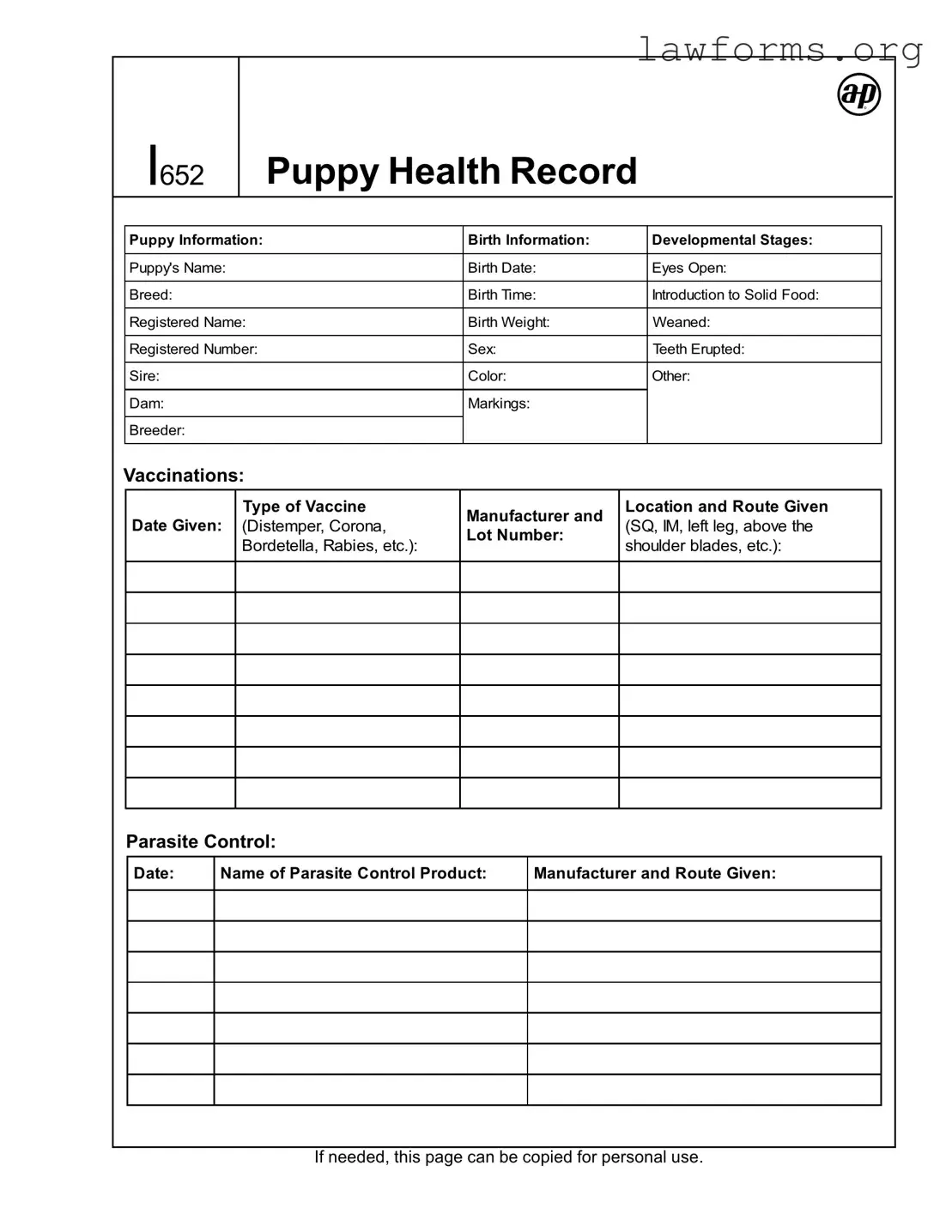Fill Out a Valid Puppy Health Record Template
Form Specs
| Fact Name | Description |
|---|---|
| Puppy Information | The form collects essential details about the puppy, including name, breed, color, and registered name. |
| Birth Information | It records the puppy's birth date, time, weight, and the names of the sire and dam. |
| Developmental Stages | Key milestones in the puppy's early life are documented, such as when eyes open and when solid food is introduced. |
| Vaccination Records | The form includes a section for tracking vaccinations, detailing the type of vaccine, date given, and manufacturer. |
| Parasite Control | Owners can note the parasite control products used, including the name, date, and manufacturer. |
| Examinations | Any examinations or procedures performed by a veterinarian or owner can be recorded, along with findings and comments. |
| Schedule of Events | A timeline of important events from birth to spay/neuter is included, outlining key ages for various procedures. |
| Copy for Personal Use | The form allows for duplication, enabling owners to maintain personal records of their puppy's health. |
| State-Specific Forms | In some states, specific laws govern the use of puppy health records; be sure to check local regulations. |
Dos and Don'ts
When filling out the Puppy Health Record form, attention to detail is crucial. Here are seven important dos and don’ts to consider:
- Do fill in all sections completely, including the puppy's name, breed, and birth information.
- Do record vaccination dates accurately to ensure proper health tracking.
- Do include the manufacturer and lot number of vaccines for future reference.
- Do note any findings or comments from examinations performed by the veterinarian.
- Don't leave any fields blank, as missing information can lead to confusion later.
- Don't forget to document the schedule of events from birth to spay or neuter.
- Don't use abbreviations or unclear terms that could be misinterpreted.
Other PDF Documents
Broward Animal Care - Immunization against rabies is mandated in many regions.
A prenuptial agreement form in Ohio is a legal document that couples complete before marriage to outline the division of assets and responsibilities in the event of divorce or separation. This agreement helps protect individual interests and provides clarity on financial matters. For those seeking a convenient way to handle this process, they can explore options available through Ohio PDF Forms, which can lead to a more secure and transparent relationship.
Geico Supplement - Detail the make of the vehicle for effective processing.
Common mistakes
-
Failing to provide complete puppy information. This includes not filling in the puppy's name, breed, or birth date. Incomplete information can lead to confusion later on.
-
Not recording vaccination details accurately. It is important to note the date given, type of vaccine, and the manufacturer. Missing this information can affect the puppy's health tracking.
-
Omitting examination findings and comments. After a vet visit, it's crucial to document any findings. This information is essential for future reference and ongoing care.
-
Ignoring the schedule of events from birth to spay or neuter. Keeping track of these milestones helps ensure that the puppy receives necessary care at the right times.
Documents used along the form
The Puppy Health Record form is an essential document for tracking the health and development of a puppy. Several other forms and documents are commonly used in conjunction with this record to ensure comprehensive care and management of a puppy's health. Below is a list of these documents, each briefly described.
- Veterinary Examination Report: This document details the findings from a veterinary check-up. It includes information on the puppy's overall health, any medical concerns, and recommendations for treatment or further care.
- California DV-260 Form: This confidential document is vital for those dealing with domestic violence situations. It assists in managing restraining orders while safeguarding sensitive information. For more information, visit https://californiadocsonline.com/california-dv-260-form/.
- Vaccination Schedule: This schedule outlines the timing and types of vaccinations a puppy should receive. It helps ensure that vaccinations are administered at the appropriate intervals to maintain health.
- Parasite Control Record: This record tracks the administration of parasite control products. It includes details about the type of product used, the date given, and any observed effects on the puppy.
- Health Insurance Policy: This document provides details about the puppy's health insurance coverage. It includes information on what conditions are covered and the process for filing claims.
- Microchip Registration Form: This form is used to register the puppy's microchip information. It includes the microchip number and the owner's contact details, which are crucial for identification if the puppy is lost.
- Breeder's Contract: This contract outlines the terms of sale between the breeder and the new owner. It may include health guarantees, return policies, and responsibilities of both parties regarding the puppy's care.
- Training Log: This log tracks the puppy's training progress and milestones. It helps owners monitor behavioral development and training needs over time.
- Dietary Plan: This document outlines the puppy's nutritional requirements and feeding schedule. It ensures that the puppy receives a balanced diet suitable for its age and breed.
Using these documents in conjunction with the Puppy Health Record form can help ensure a comprehensive approach to a puppy's health and well-being. Proper documentation aids in tracking health history, vaccinations, and care instructions, which are essential for responsible pet ownership.
Misconceptions
Misconceptions about the Puppy Health Record form can lead to confusion among new pet owners. Here are four common misconceptions:
- The form is only for veterinarians. Many believe that the Puppy Health Record is solely for veterinary use. In reality, it is designed for both owners and vets to track important health information.
- All vaccinations are given at the same time. Some people think that all vaccinations can be administered during a single visit. However, vaccinations should ideally be spaced out, usually at three-week intervals, to ensure the puppy's immune system responds properly.
- Parasite control is optional. Many assume that parasite control is not crucial for their puppy. This is a misconception, as regular parasite control is essential for the puppy's health and well-being.
- The form is not necessary if the puppy is registered. Some believe that having their puppy registered eliminates the need for a health record. However, the Puppy Health Record provides detailed health information that registration does not cover.
Preview - Puppy Health Record Form

I652
PuppyHealthRecord
Puppy Information: |
Birth Information: |
DevelopmentalStages: |
|
|
|
Puppy's Name: |
BirthDate: |
Eyes Open: |
|
|
|
Breed: |
BirthTime: |
Introductionto Solid Food: |
|
|
|
Registered Name: |
BirthWeight: |
Weaned: |
|
|
|
Registered Num er: |
Sex: |
TeethErupted: |
|
|
|
Sire: |
Color: |
Other: |
|
|
|
Dam: |
Markings: |
|
|
|
|
Breeder: |
|
|
|
|
|
Vaccinations:
Date Given:
Type of Vaccine (Distemper,Corona, Bordetella,Ra ies,etc.):
Manufacturer and ot Number:
ocation and Route Given (SQ,IM,leftleg,a ove the shoulder lades,etc.):
ParasiteControl:
Date: |
Name of Parasite ControlProduct: |
Manufacturer and Route Given: |
|
|
|
|
|
|
|
|
|
|
|
|
|
|
|
|
|
|
|
|
|
|
|
|
Ifneeded,thispagecanbecopiedforpersonaluse.

I652
PuppyHealthRecord PAGE 2
ExaminationsorProceduresPerformedbyOwnerorVeterinarian:
Date: |
Findings and Comments: |
|
|
Owner or Veterinarian Initials:
Schedule of Events fromBirthtoSpayor Neuter
*Each vaccination should ideallybegivenatthree weekintervals.
**Thetimetobeginheart- worm medication can vary dependingontheproduct andtimeofyear.
***The
SeepagesA622andA905for parasitecontrolandvaccination suggestions.
Events |
Age |
Date |
|
|
|
Birthdate |
Day1 |
|
|
|
|
Dewclawremovaland taildock |
|
|
|
|
|
2 weeks |
|
|
|
|
|
Toenailtrim |
2 weeks |
|
|
|
|
Solid food introduction |
3 weeks |
|
|
|
|
4 weeks |
|
|
|
|
|
Toenailtrim |
5 weeks |
|
|
|
|
1stcar trip |
6 weeks |
|
|
|
|
1stshot |
|
|
|
|
|
Physicalexamination yvet |
|
|
|
|
|
6 weeks |
|
|
|
|
|
Weaning |
|
|
|
|
|
Move to cages |
7 weeks |
|
|
|
|
8 weeks |
|
|
|
|
|
Toenailtrim |
9 weeks |
|
|
|
|
2nd Shot* |
|
|
|
|
|
3rd Shot |
|
|
|
|
|
Beginheartwormmedication** |
|
|
|
|
|
12 weeks |
|
|
|
|
|
4thand finalshots |
|
|
|
|
|
Spayor neuter |
|
|
|
|
|
Ifneeded,thispagecanbecopiedforpersonaluse.
Key takeaways
Understanding the Puppy Health Record form is crucial for ensuring your puppy's health and well-being. Here are some key takeaways to keep in mind:
- Puppy Information: Fill out all sections regarding your puppy's name, breed, birth date, and other identifying details. This information is vital for tracking their health history.
- Vaccination Records: Keep a detailed log of vaccinations, including dates, types of vaccines, and the manufacturer. This helps ensure your puppy receives necessary immunizations on schedule.
- Parasite Control: Document any parasite control measures taken. Include the product name, manufacturer, and date administered. This is important for your puppy's overall health.
- Developmental Stages: Track key milestones, such as when your puppy's eyes opened or when they were introduced to solid food. This information can help identify any developmental concerns.
- Examinations: Record any examinations or procedures performed by you or a veterinarian. Include findings and comments, as this will provide a comprehensive health history.
- Schedule of Events: Follow the suggested timeline for vaccinations, deworming, and other critical events. Adhering to this schedule promotes a healthy start for your puppy.
- Copy for Personal Use: If necessary, make copies of the form for your records. Having multiple copies can help you stay organized and informed.
- Consult with a Veterinarian: Always consult your veterinarian for personalized advice regarding vaccinations and health care. Their expertise is invaluable in keeping your puppy healthy.
By following these guidelines, you can ensure that your puppy receives the best possible care during their early developmental stages. Keeping accurate records not only helps you but also aids your veterinarian in providing the best care for your furry friend.
Similar forms
-
Veterinary Health Record: This document tracks a pet's health history, including vaccinations, treatments, and any medical issues. Similar to the Puppy Health Record, it provides a comprehensive overview of the pet's health and care over time.
- RV Bill of Sale: The https://georgiaform.com serves as a vital resource for those looking to draft an RV Bill of Sale, ensuring that all necessary details about the transaction are documented clearly and legally, making the transfer of ownership straightforward.
-
Pet Vaccination Record: This form specifically focuses on vaccinations given to a pet. Like the Puppy Health Record, it includes details such as vaccine types, dates administered, and the veterinarian's information, ensuring that pet owners stay on top of their pet's immunization schedule.
-
Pet Adoption Agreement: This document outlines the responsibilities of the new pet owner and the terms of adoption. While the Puppy Health Record tracks health details, the adoption agreement ensures that the owner understands the commitment involved in caring for a pet.
-
Pet Insurance Policy: This document provides coverage details for a pet's health care needs. Similar to the Puppy Health Record, it emphasizes the importance of regular check-ups and vaccinations, helping owners manage unexpected health expenses.
-
Breeder Contract: This agreement between the breeder and the pet owner includes health guarantees and care instructions. It aligns with the Puppy Health Record by ensuring that the new owner is informed about the puppy's health history and needs.
-
Animal Medical Release Form: This form allows a veterinarian to treat a pet in the owner's absence. Like the Puppy Health Record, it emphasizes the importance of medical history and treatment details, ensuring that the pet receives proper care even when the owner is not present.
